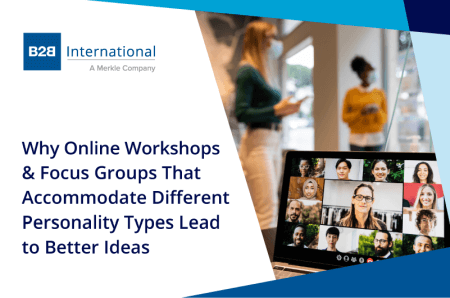
Perhaps the biggest shift businesses have had to make since the pandemic began is that of remote working. Discussions that used to take place face-to-face in offices and meeting rooms are now being conducted online through video calls whilst sat at home.
For the market research industry in particular, this shift has not only changed how internal meetings are run but also how they run discussions with clients and research respondents through workshops and focus groups.
While it’s easy to think that our ability as researchers to run and gather meaningful results from workshops and focus groups has suffered in the absence of face-to-face, the opposite may actually be true. The answer why lies in the fact that online workshops and online focus groups can be more accommodating of different personality types.
Extroverts are among those who have missed the face-to-face working and group interaction aspects of workshops and focus groups the most during the past couple of years. However, those who are naturally more introverted may have found it easier to participate and share ideas in group discussions from the comfort of their own homes, especially when using online collaboration tools such as interactive whiteboards.
Given that at least a third of people are on the introverted side, online workshops and focus groups that make use of interactive collaboration tools alongside traditional group discussions can empower both introverts and extroverts to generate more and better-quality ideas.
3 reasons why online workshops and focus groups that accommodate both introverts and extroverts lead to greater idea generation
-
Everyone gets their voice heard
One of the biggest disadvantages of traditional face-to-face workshops and focus groups is that the loudest and most extroverted people can dominate the discussion and often are the ones whose ideas are taken on by the group. Studies have also shown that groups tend to follow those people who initiate action and the first idea mentioned is often used as the anchor for the rest of the discussion. Those who are more introverted may not feel comfortable in sharing their own ideas once the group has started to run with another idea.
In an online setting, however, this problem can be erased with the use of online collaboration tools such as interactive whiteboards. By setting aside time to add ideas to an interactive whiteboard simultaneously, every participant gets the chance to share their ideas and have their voices heard before the wider group discussions begin.
-
Everyone gets time to think and be creative
When asked to come up with ideas, there are people who speak to think and there are people who think to speak. For introverts especially, it can be much easier to contribute ideas after they’ve had chance to think quietly about the topic rather than have to come up with ideas on-demand during a busy back-and-forth discussion.
Yet while having time to think is certainly beneficial for introverts, studies have shown that all of us can benefit from working alone when trying to come up with ideas and be creative.
In one particular study, people were split into groups and asked to come up with ideas and also asked to come up with ideas working alone. The ideas generated were graded not just on quantity but also quality and the results showed that people produced more ideas when working on their own and they also produced ideas of equal or better quality.
-
More ideas from more people leads to more productive discussions
As mentioned earlier, traditional face-to-face workshops and focus groups can suffer when discussions only focus on the views and ideas from dominant personalities. Potentially great ideas could be missed from the quieter, more introverted personalities if they don’t feel comfortable speaking up during these discussions.
When sessions set aside time for simultaneous idea contribution via an online whiteboard or similar tool, we have witnessed first-hand that many more views and ideas have been collected from a wider range of participants than we would have seen during a face-to-face workshop or focus group.
Increasing the number of views and ideas that feed into the wider group discussions significantly increases the chances of gathering the most representative view of a topic and finding the best possible idea or solution.
How to design face-to-face workshops and focus groups that accommodate different personality types
While this article has focused on the benefits of making online workshops and focus groups more accommodating to different personality types in terms of the number and quality of ideas generated, it is also possible to take these learnings and apply them to face-to-face sessions.
Here are some guidelines to follow:
The environment – create a physical space in a quiet area away from the group where people can write down their thoughts and ideas.
The structure – Share a detailed agenda and give advance notice of what will be happening during the session. Allow for plenty of processing time during the session and introduce exercises before a break to allow people to think about their answers before group discussions begin.
The exercises – Allow time for participants to work alone as well as in groups and ensure everyone writes down their ideas.
Readers of this blog also viewed:


